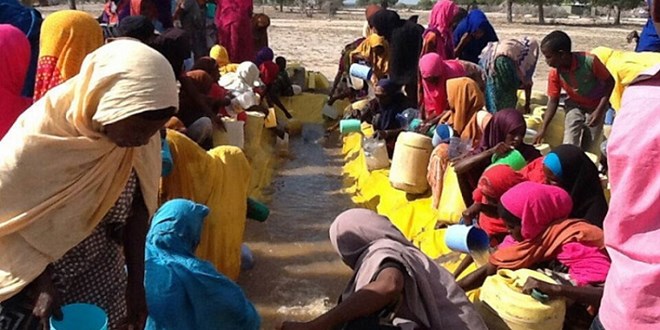
Wednesday November 10, 2021

Pastoralist families in villages in Adado struggle to get clean water, as water levels in the village's only well drops/File Photo/Ergo
(ERGO) – Hussein Mohamoud Abdi spends up to nine hours of his day lining up at the only well in Dhagtuur village in central Somalia’s Adado district to get a minimal amount of water for his family.
His goats have not had water for weeks and he fears for their survival.
He goes to the well very early in the morning and returns late in the day with just a 20-litre jerry can of water to last his family of nine for the next 24 hours.
“If you come late, you have no hope of getting water from this well. There are people who queue here the whole day and return home in the evening without water. People start queueing here from late at night,” Hussein said.
“This is not life at all! After queueing that long, the water you get is not even clean. We fear an outbreak of acute watery diarrhoea.”
Hussein last watered his 150 goats on 24 October, when the current water crisis began.
After a little rain fell in Daghtuur, many pastoralists from neighbouring areas moved to the village with their livestock. The influx caused the water level in the only well to drop. The village commissioner was prompted to appoint a five-member committee to manage and distribute the water. The committee opens the well in the morning and closes it at night, allowing each family to fetch 20-litres of water a day free of charge.
One of the recent arrivals in Dhagtuur is Hawo Ali Mohamoud, a mother of five, who moved from Biya-gadud village, 95 kilometres away, when she heard that the area had rainfall. She is economizing with the water her husband fetches from the well by cooking rice once in the evening, and dividing it into one portion for dinner and another portion for the following day’s breakfast. The children do not bathe as there is not enough water.
“Sometimes we use the 20 litres of water for more than 24 hours. We neither wash clothes nor bathe the children with it. We only use it for cooking and drinking,” she said.
Trucks delivering water to Dhagtuur village sell at five to six dollars per 200 litre barrel. The cost is too high for the pastoralists, whose feeble livestock have no market value now due to the drought conditions. Hawo’s family cannot afford these prices and have not watered their herd of 120 goats and two camels for 10 days.
“Our livestock are thirsty and the little water we fetch from the well is not even good for human consumption, but we use it as we have nothing else now. When you use it to cook, the food tastes salty,” she complained.
The residents of Dhagtuur and the recent arrivals are facing the same challenges and together they queue at the well to get water on a on first come, first served basis.
The commissioner of Dhagtuur, Hassan Mohamed Kayre, told Radio Ergo that he is concerned about the worsening water shortage. He fears the villagers will face a tougher situation in the coming days if the rain does not arrive and there is no emergency humanitarian aid.
“People might die of thirst if the situation remains as it is currently. The most vulnerable people are the children and the elderly people, who can’t cope with acute lack of water,” he said.